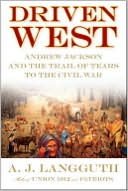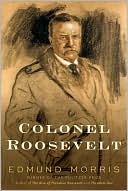Driven West: Andrew Jackson and the Trail of Tears to the Civil War
Search in google:
By the acclaimed author of the classic Patriots and Union 1812, this major work of narrative history portrays four of the most turbulent decades in the growth of the American nation. After the War of 1812, President Andrew Jackson and his successors led the country to its manifest destiny across the continent. But that expansion unleashed new regional hostilities that led inexorably to Civil War. The earliest victims were the Cherokees and other tribes of the southeast who had lived and prospered for centuries on land that became Alabama, Mississippi, and Georgia. Jackson, who had first gained fame as an Indian fighter, decreed that the Cherokees be forcibly removed from their rich cotton fields to make way for an exploding white population. His policy set off angry debates in Congress and protests from such celebrated Northern writers as Ralph Waldo Emerson. Southern slave owners saw that defense of the Cherokees as linked to a growing abolitionist movement. They understood that the protests would not end with protecting a few Indian tribes. Langguth tells the dramatic story of the desperate fate of the Cherokees as they were driven out of Georgia at bayonet point by U.S. Army forces led by General Winfield Scott. At the center of the story are the American statesmen of the day—Henry Clay, John Quincy Adams, John C. Calhoun—and those Cherokee leaders who tried to save their people—Major Ridge, John Ridge, Elias Boudinot, and John Ross. Driven West presents wrenching firsthand accounts of the forced march across the Mississippi along a path of misery and death that the Cherokees called the Trail of Tears. Survivors reached the distant Oklahoma territory that Jackson had marked out for them, only to find that the bloodiest days of their ordeal still awaited them. In time, the fierce national collision set off by Jackson’s Indian policy would encompass the Mexican War, the bloody frontier wars over the expansion of slavery, the doctrines of nullification and secession, and, finally, the Civil War itself. In his masterly narrative of this saga, Langguth captures the idealism and betrayals of headstrong leaders as they steered a raw and vibrant nation in the rush to its destiny. Publishers Weekly USC professor of journalism Langguth (Union, 1812) maintains America's first civil war occurred during the 1830s when Andrew Jackson expelled Indian tribes from the Deep South. Recounting the events from 1825 through the Civil War (which forced the Cherokees to choose between North and South), he puts in context the expulsion of the Cherokees from the South and their tragic Trail of Tears. Langguth proceeds through chapters that each focus on one figure in the drama, from John Calhoun to Cherokee chief John Ross. By 1820, wars and draconian peace treaties had already eliminated many Indians from the South. Exhorted by Southern white leaders to move to Oklahoma territory, some complied, but many refused; some became Christian. The end came when Andrew Jackson overcame Northern opposition to the 1830 Indian Removal Act. The army ejected reluctant Indians and with little planning for the long trip, 25%-50% percent of the 50,000 deportees died of disease and starvation. Readers of this engrossing, profoundly depressing history may not consider the fight over Indian removal civil war, but few will doubt that it represents a bitter North-South conflict in which the bad guys won. B&w photos. (Nov.)








